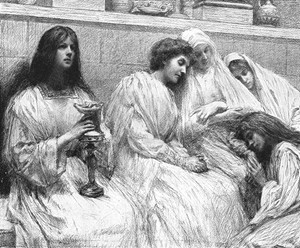The Gospel story of the ten virgins is not about wedding customs or about charity or even about staying awake at night. Rather it is about being ready, being vigilant, paying attention – so that we never miss an opportunity to experience every moment of our lives to the fullest. It is a parable of urgency, a parable which urges us not to waste the opportunities that are offered us. The crucial difference between the wise and foolish has nothing to do with staying awake, but with having sufficient oil. Foreseeing that the bridegroom might delay, the wise bridesmaids brought additional flasks of oil, while the foolish neglected the task. And even though they all fell asleep waiting, only the wise had made the proper preparations, while the foolish found themselves locked out of the feast.
 Discipleship involves more than simply being part of the wedding party.
Discipleship involves more than simply being part of the wedding party.
What does all of this mean for us? There is no one perfect style, no one method or mood that is appropriate to being a Christian. But there is, indeed, one absolutely essential element that all true Christians must share in common: keeping vigil with joyful hope. And so, our response must be that of watchfulness, not in the sense of neglecting the duties to which our Christian life calls us, but to the extent that each day must be one of attentiveness, expectation, and hope.
It is especially important to bring this message to the world today.
It is not a message for Christians alone. It is one that suggests specific priorities that must be addressed by all peoples: the protection of human life, the promotion of family life and values, the quest for social justice and the pursuit of global solidarity. It is a matter of respecting life -all life.
And while not promoting specific solutions, the message of Jesus asks some very pointed questions. Among them are:
- How will we protect the weakest in our midst-innocent, unborn children?
- How will we address the consequences of hunger, debt, and lack of development around the world?
- How can we raise our children with respect for life, sound moral values, a sense of hope, and an ethic of stewardship and responsibility?
- How will we address the growing number of families and individuals without affordable and accessible health care? How can health care protect and enhance human life and dignity?
- What are we doing to address the needs of migrants and refugees?
- How do we combat continuing prejudice, bias, and discrimination and heal the wounds of racism, religious bigotry, and other forms of discrimination?
- Why does it seem that our nation is turning to violence to solve some of its most difficult problems?
We are pilgrims in a changing world and not always perfect and there is, indeed, one absolutely essential element that all of us must share in common: keeping vigil and paying attention to this world and to others around us. We have a great opportunity to hold one another accountable to address the important moral issues that the world faces today.
Being a disciple implies that one has to make hard choices: we will not always get what we want. We may find ourselves at odds with others who do not share our values. It's not easy. It's never easy to do what needs to be done, to say what needs to be said, to work things out when it bothers us to compromise. And then, too, it's not easy to wait. It's not easy to be out of control, without power. It's not easy to allow another, even God, to have the final word.
Jesus tells us: "Be prepared, stay awake." Pay Attention.
There can be no excuses if we don't. And if we have not prepared well, we may find ourselves standing in front of a locked door. And then it will be too late.
Image: The Ten Virgins - Eugène Burnand





